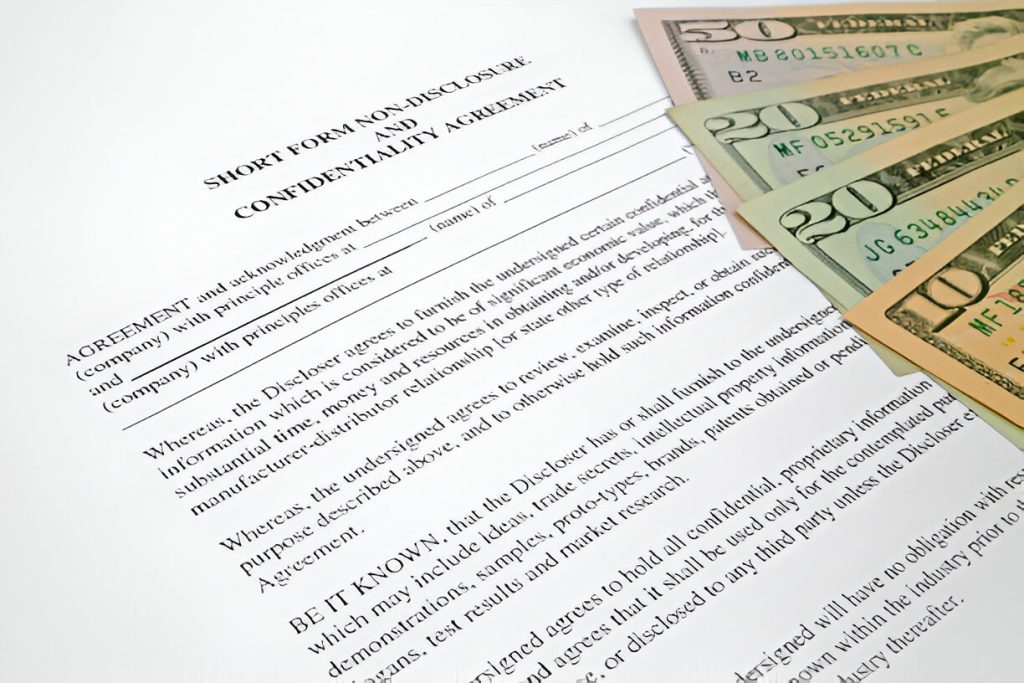
Entering into a Breach of Deposit Contract, especially in real estate transactions, requires a clear understanding of the potential risks and legal ramifications. A breach of a deposit contract can lead to significant financial and legal consequences.
This blog will delve into the specifics of what constitutes a breach of a deposit contract, the relevant laws such as Article 1454 of the Civil Code, and specific scenarios like breaches due to force majeure and non-compliance with confirmatory deposits. We’ll also address frequently asked questions to help you navigate these complex situations.
Breach of Deposit Contract: Key Concepts and Legal Framework
A Breach of Deposit Contract occurs when one party fails to fulfill their obligations as outlined in the agreement. This section will explore the fundamental aspects of deposit contracts, the implications of Article 1454 Civil Code, and how different breach scenarios are handled.
Understanding Deposit Contracts
A deposit contract involves two primary parties: the depositor and the depositary. The depositor provides an item or money for safekeeping, which the depositary must return under the agreed conditions. In real estate, this often involves earnest money deposited by the buyer to demonstrate their serious intent to purchase a property.
Key Elements of a Deposit Contract
- Parties Involved: The depositor is the party providing the item or money, while the depositary is responsible for its safekeeping. In real estate, the buyer is typically the depositor, placing earnest money with the seller or an escrow agent (the depositary).
- Object of the Deposit: The object of the deposit is typically money or valuable items. In real estate transactions, the earnest money serves as a financial commitment from the buyer, indicating their intention to follow through with the purchase.
- Conditions for Return: The terms under which the deposit must be returned to the depositor are crucial. These conditions must be clearly outlined in the contract to avoid disputes and ensure that both parties understand their obligations and rights.
Article 1454 Civil Code: Earnest Money and Its Implications
Article 1454 of the Civil Code provides clear guidelines regarding the use of earnest money in purchase agreements. It is a critical provision that outlines the consequences of non-compliance by either party.

Earnest Money Under Article 1454 Civil Code
- Buyer’s Non-Compliance: If the buyer fails to fulfill their obligations under the contract, they forfeit the earnest money. This forfeiture acts as compensation to the seller for the buyer’s breach and serves as a deterrent against frivolous commitments.
- Seller’s Non-Compliance: If the seller fails to comply with the terms of the contract, they must return double the amount of the earnest money to the buyer. This penalty is designed to protect the buyer from the seller’s breach and ensure that sellers are equally committed to the transaction.
This provision aims to protect both parties and ensure serious commitment to the transaction.
Common Scenarios Leading to Breach of Deposit Contract
Breach of a deposit contract can occur under various circumstances. This section explores some typical scenarios, including non-compliance with confirmatory deposits non-compliance and breaches due to force majeure.
Non-Compliance with Confirmatory Deposits
confirmatory deposits non-compliance are payments made to affirm the buyer’s commitment to the purchase. Non-compliance occurs when the buyer fails to pay the deposit within the agreed timeframe, resulting in forfeiture of the deposit.
Implications of Non-Compliance
- Forfeiture of Deposit: The buyer loses the deposit paid if they fail to comply with the terms of the deposit agreement. This loss serves as compensation to the seller for the buyer’s breach.
- Seller’s Recourse: The seller can retain the deposit as compensation for the breach. This retention acts as a remedy for the seller, who may have incurred costs or missed opportunities due to the buyer’s non-compliance.
Breach Due to Force Majeure
Force majeure refers to unforeseeable events that prevent a party from fulfilling their contractual obligations. This can include natural disasters, wars, or other significant events.
Legal Perspective on Force Majeure
- Contractual Clauses: Many contracts include force majeure clauses that outline what constitutes a force majeure event and the relief available to the parties. These clauses specify the events considered beyond the parties’ control and the consequences of such events on the contract.
- Legal Excuse: Depending on the jurisdiction and specific circumstances, force majeure may legally excuse non-performance without penalty. The affected party must demonstrate that the event was unforeseeable, beyond their control, and prevented them from fulfilling their contractual obligations.
Legal Consequences of a Breach
The legal consequences of breaching a deposit contract are severe and can include financial penalties, legal action, and damage to one’s reputation.
Financial Penalties
As specified in Article 1454 Civil Code, the financial repercussions for non-compliance are clear and significant.
Article 1454 Civil Code and Financial Penalties
- Buyer’s Penalty: Forfeiture of earnest money serves as the buyer’s penalty for non-compliance. This penalty compensates the seller for the buyer’s breach and serves as a deterrent against non-serious commitments.
- Seller’s Penalty: The seller must return double the amount of the earnest money if they breach the contract. This significant financial penalty ensures that sellers are equally committed to the transaction and provides a remedy for the buyer’s potential losses.

These penalties serve as a deterrent to prevent non-compliance.
Legal Action
If a breach occurs, the non-breaching party may seek legal recourse to enforce the contract terms or recover damages.
Steps in Legal Action
- Filing a Lawsuit: The non-breaching party can file a lawsuit to seek compensation for damages or enforce specific performance of the contract. This legal action initiates the judicial process to resolve the dispute.
- Court Proceedings: The case proceeds through the court system, where a judge or jury determines the outcome based on the presented evidence and arguments. This process includes pre-trial motions, discovery, and trial.
- Enforcement of Judgment: If successful, the judgment is enforced to recover damages or compel specific performance. The court may issue orders to ensure compliance with the judgment, such as garnishing wages or seizing assets.
Impact on Reputation
Breaching a deposit contract can also have a lasting impact on one’s reputation, affecting future business and personal relationships.
Trust and Future Transactions
- Loss of Trust: Breaches erode trust between parties, making future transactions more difficult. Trust is a crucial component in business relationships, and a history of breaches can damage one’s credibility.
- Professional Reputation: Businesses that frequently breach contracts may find it challenging to attract new clients or partners. A tarnished reputation can result in lost opportunities and decreased business prospects.
Preventing Breach of Deposit Contracts
Preventing a breach of deposit contract due to force majeure involves careful planning, clear communication, and legal guidance. Here are some strategies to mitigate the risk of breaches.
Clear Contract Terms
Ensure that the contract terms are clear and comprehensible to all parties involved.
Essential Clauses
- Deposit Amount and Conditions: Clearly state the deposit amount and conditions for return or forfeiture. These terms should be specific and unambiguous to prevent misunderstandings.
- Timelines: Specify all relevant timelines, including deadlines for deposit payments and contract completion. Clear timelines help manage expectations and ensure that all parties are aware of their obligations.
Regular Communication
Maintain open and regular communication to address any potential issues before they escalate into breaches.
Effective Communication Strategies
- Regular Updates: Provide regular updates on the transaction’s progress. Keeping all parties informed helps prevent misunderstandings and ensures that everyone is aware of any changes or developments.
- Prompt Resolution of Issues: Address any concerns or misunderstandings immediately. Prompt communication helps resolve issues before they become significant problems, reducing the risk of breaches.
Legal Guidance
Seek legal advice when drafting or entering into a deposit contract to ensure it is fair, legally binding, and includes provisions for potential breaches.
Role of Legal Advisors
- Contract Drafting: Legal advisors can help draft clear and enforceable contracts. They ensure that the contract terms comply with relevant laws and adequately protect the parties’ interests.
- Dispute Resolution: In case of disputes, legal advisors can provide guidance on resolution strategies. They can help negotiate settlements or represent the parties in legal proceedings to resolve the dispute effectively.
How Charfort Can Assist with Deposit Contract Issues
At Charfort, we understand the complexities and challenges involved in deposit contracts, especially within the real estate sector. Our comprehensive services are designed to help you navigate these intricate agreements with confidence and ease.

Expert Legal Consultation
Our team of experienced legal advisors is well-versed in the nuances of deposit contracts. We can provide you with tailored advice and assistance, ensuring that your contract terms are clear, fair, and legally binding. Whether you are a buyer or a seller, our experts can help draft, review, and negotiate your deposit contracts to protect your interests and minimize the risk of breaches.
Dispute Resolution Services
In the unfortunate event of a breach of deposit contract due to force majeure, Charfort offers robust dispute resolution services. We can represent you in negotiations, mediations, or court proceedings to seek fair and just outcomes. Our goal is to resolve conflicts efficiently and effectively, safeguarding your rights and financial interests.
Educational Resources and Workshops
Charfort is committed to empowering our clients with knowledge. We offer educational resources, including articles, guides, and workshops, to help you understand the legal and financial aspects of deposit contracts. Our resources are designed to provide you with the information you need to make informed decisions and avoid common pitfalls.
Regular Communication and Updates
We believe in the importance of clear and regular communication. Our team will keep you informed at every stage of the transaction, providing updates and addressing any concerns promptly. This proactive approach helps prevent misunderstandings and ensures that all parties are on the same page.
Tailored Strategies for Preventing Breaches
Preventing breaches of deposit contracts is a priority at Charfort. We work closely with our clients to develop tailored strategies that mitigate risks. From drafting clear contract terms to maintaining open lines of communication, we implement best practices to help you avoid potential issues.
At Charfort, we are dedicated to providing exceptional service and support for all your deposit contract needs. Whether you are entering into a new agreement or dealing with a breach, our team is here to help you navigate the complexities with confidence and peace of mind. Visit our website to learn more about our services and how we can assist you.
Frequently Asked Questions (FAQs)
What is Article 1454 of the Civil Code?
Article 1454 of the Civil Code deals with earnest money in purchase agreements. It outlines the consequences of non-compliance, specifying that the buyer forfeits the earnest money if they fail to fulfill their obligations, and the seller must return double the amount of the earnest money if they breach the contract.
How does force majeure affect a deposit contract?
Force majeure refers to unforeseeable events that prevent contractual performance. If a contract includes a force majeure clause, it may excuse non-performance without penalty if such events occur. However, the specific impact depends on the contract’s terms and the jurisdiction.
What are confirmatory deposits non-compliance?
confirmatory deposits non-compliance are payments made by the buyer to confirm their commitment to the purchase. Non-compliance with confirmatory deposits typically results in the forfeiture of the deposit, serving as compensation to the seller for the buyer’s breach.
What are the legal consequences of breaching a deposit contract?
The legal consequences of breaching a deposit contract can include financial penalties (forfeiture or return of double the earnest money as per Article 1454 Civil Code), legal action to recover damages or enforce contract terms, and damage to one’s reputation, affecting future transactions.
How can breaches of deposit contracts be prevented?
Breaches of deposit contracts can be prevented by ensuring clear contract terms, maintaining regular communication, and seeking legal guidance. These strategies help clarify expectations, address issues promptly, and provide a solid legal framework to support the contract.
Conclusion
Understanding the implications of a breach of deposit contract due to force majeure is essential for anyone involved in such agreements.
Article 1454 of the Civil Code provides clear guidelines on the consequences of non-compliance, particularly regarding earnest money. Whether dealing with non-compliance of confirmatory deposits or breaches due to force majeure, being aware of the legal and financial ramifications is crucial.
By ensuring clear contract terms, maintaining communication, and seeking legal guidance, parties can mitigate the risk of breaches and protect their interests.

